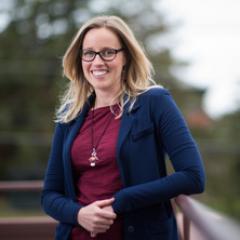CBCS alumna
After almost 20 years at The University of Queensland, I’m hanging up my academic bonnet for a job in the private sector. My new role is with The Biodiversity Consultancy (TBC), a UK-based company working with companies and financial institutions to improve the current state of nature. I’ll be directing TBC’s Science and Policy program and looking forward to continuing partnerships with UQ and other academic institutions.

Parting ways, reluctantly
Leaving academia was not an easy decision. It took the better part of two years to make and was made incredibly difficult knowing that I would be leaving behind my brilliant team of students, postdocs and research assistants. Working with Tom, Ilyas, Chloe, Bora, Alex, Jayden, Sreekar, Natasha, Robyn, Jaramar, Pablo, Natasha, Lasinidu and many others has been by far the best part of my job.
But ultimately, it came down to wanting to learn some new skills, make some new friends, and have a go at creating change from “within” industry by engaging with some of the sectors that cause the most damage to biodiversity.
My research at UQ has focused on improving the biodiversity outcomes of mining. It’s also been driven by a personal goal to improve and facilitate interactions between the conservation community and the mining and metals sectors. My group and I have made huge headway in this regard, infiltrating major industry focused events (including World Mining Congress in 2023), and developing new tools and knowledge to illustrate global deforestation driven by mining, exploring the impacts of mining and energy development scenarios on biodiversity, and examining various policy options to conserve areas under pressure.
I’ve been lucky enough to work with some very clever people during my career, including many members of CBCS. Many key highlights link back to the workshops led by Martine Maron for a project funded by the Science for Nature Partnership. These workshops gave me a first peek into how science and research can be done outside academic institutions, led by NGOs, consultancies and industry. They also delivered peeks at the elusive shoebill, tree-climbing lions and orangutangs in Uganda.

Real impact
Through these international partnerships and collaborations, we’ve also had real impact. For example, my work with wonderful colleagues at the University of Sao Paulo in Brazil has been revealing the direct and indirect impacts of largescale iron and bauxite mining in Brazil. Outputs have informed industry mining standards and commitments to nature and sustainability, and national and international policy on where and how to manage and mitigate mining risks to nature. I’ll be watching eagerly to see what great stuff comes next from CBCS, while working furiously to stay involved with the incredible breadth of important conservation science being done at UQ. Thanks for making my time at UQ so wonderful and please stay in touch!
To keep up to date on our latest events, check out our Bluesky and LinkedIn.

